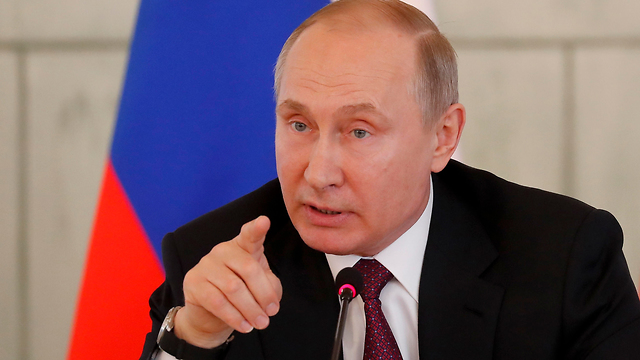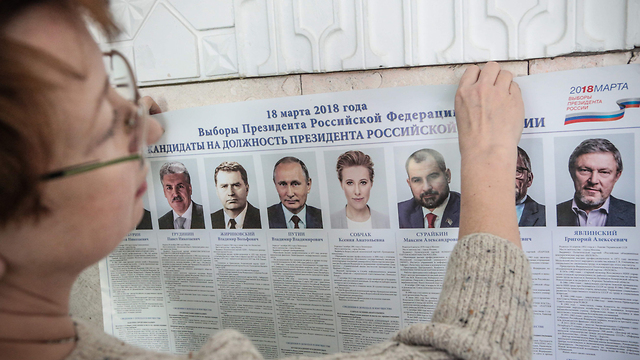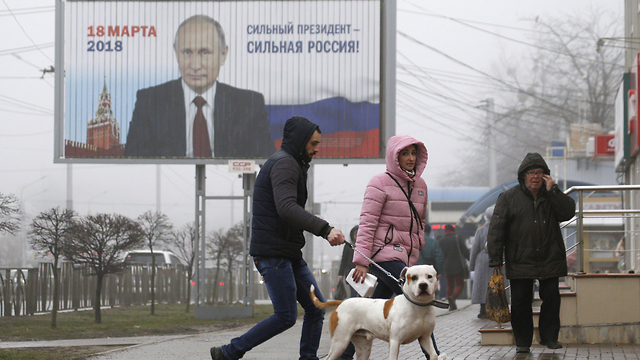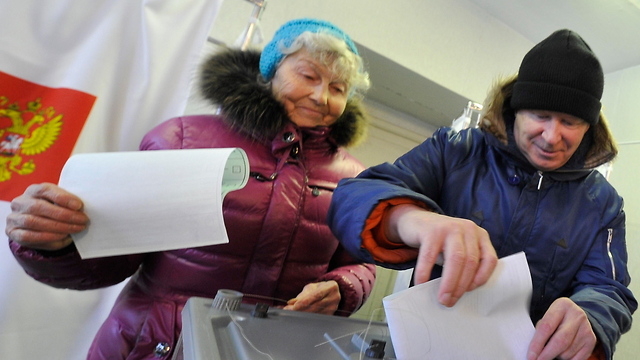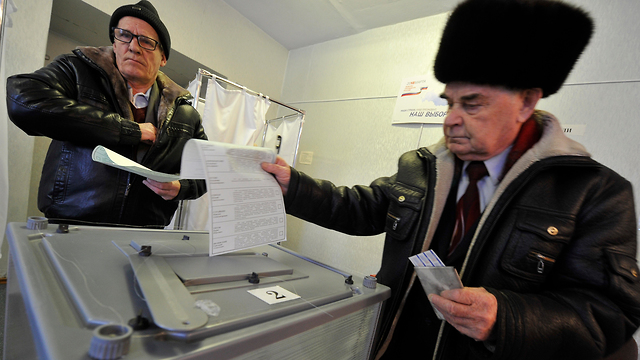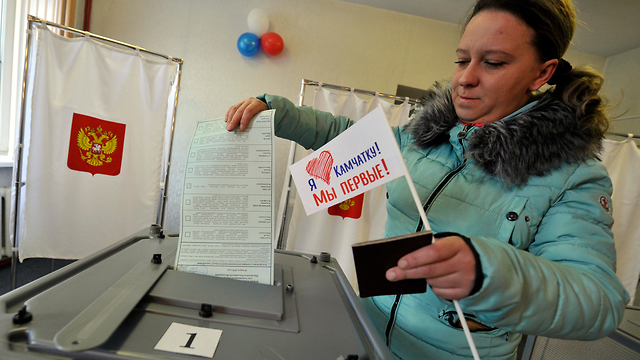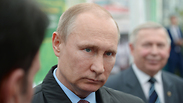
Putin on track for commanding win as Russians head to polls
The incumbent Russian president is expected to receive around 70% of the vote, with many voters seeing no point in going to the ballots; in effort to lure them to the polls, officials offer discounted food, employees pressured to vote by bosses.
Russians voted in a presidential election on Sunday set to give Vladimir Putin a runaway victory, the only possible blemish for the Kremlin being if large numbers of voters do not bother taking part because the result is so predictable.
Opinion polls give Putin, the incumbent, support of around 70 percent, or nearly 10 times the backing of his nearest challenger. Another term will take him to nearly a quarter century in power—a longevity among Kremlin leaders second only to Soviet dictator Josef Stalin.
Putin's opponents alleged officials were trying to inflate the turnout.
Many voters credit Putin, a 65-year-old former KGB spy, with standing up for Russia's interests in a hostile outside world, even though the cost is confrontation with the West.
A row with Britain over allegations the Kremlin used a nerve toxin to poison a Russian double agent in a sleepy English town—denied by Moscow—has not dented his standing.
The majority of voters see no viable alternative to Putin: he has total dominance of the political scene and the state-run television, where most people get their news, gives lavish coverage of Putin and little airtime to his rivals.
Galina Zhukova, a pensioner, came to polling station number 1512 in Zelenodolsk, about 800 km (500 miles) east of Moscow, with her husband, Alexei. They arrived soon after the doors opened.
"We voted for Putin. Things are all right for us," said Alexei. "And there's no one else to vote for," said Galina.
A day of voting across Russia's 11 time zones began at 8am on Saturday on Russia's eastern edge, in the Pacific coast city of Petropavlovsk-Kamchatsky.
There, voters were handed small plastic flags with the slogan: "I love Kamchatka. We are the first."
Voting will run until polls close at the westernmost point of Russia, the Kaliningrad region on the Baltic Sea, at 8pm on Sunday.
Shoo-in contest
A March 9 survey by state-run pollster VTsIOM gave Putin, who was first elected president in 2000, support of 69 percent. His nearest rival Pavel Grudinin, the Communist Party's candidate, is on just 7 percent.The first politician in years to challenge the Kremlin's grip on power, Alexei Navalny, is barred from the race because of a corruption conviction he says was fabricated by the Kremlin.
He is calling for a boycott of the election, saying it is an undemocratic farce, and deploying supporters to collect evidence of anyone rigging the ballot to inflate turnout and support for Putin. The Kremlin and election officials say any fraud will be stamped out.
The eight presidential candidates were barred from campaigning Saturday, but the message to voters was clear from billboards celebrating Russian greatness—a big theme of Putin's leadership—and Kremlin-friendly media coverage.
Putin urged Russians on Friday to "use their right to choose the future for the great Russia that we all love."
While Putin has seven challengers, none is a real threat. The last time he faced voters in 2012, he faced a serious opposition movement, but since then he has boosted his popularity thanks to Russian actions in Ukraine and Syria.
A low turnout would diminish Putin's authority in his next term, which, under the constitution, has to be his last.
"There is no intrigue. I do not see any point for me in going to the election," said Alexei Khvorostov, a resident of Krasnodar, in southern Russia.
Yevgeny Roizman, a Kremlin opponent who is mayor of the industrial city of Yekaterinburg, said officials have all received orders "from higher up" to make sure the presidential vote turnout is over 60 percent, and are using bribes and inducements to persuade people to vote.
"They're herding the whole country to the polling stations," Roizman, a rare example of an elected official opposed to the Kremlin, said in a video blog. "It's degrading... We're not sheep."
More than 1,500 international observers are joining thousands of Russian observers to watch the vote. The government wants to ensure that this election is clean after ballot stuffing and fraud marred the last Russian presidential election in 2012.
A Russian election monitoring group said Saturday it has registered an "alarming" rise in recent days in complaints that employers are forcing or pressuring workers to vote.
Discounted food and school performances to lure voters
Grigory Melkonyants, co-chair of the independent Golos center, told the AP on Saturday the group has also recorded smaller complaints, such as gimmicks like discounted potatoes for people who vote, or schools holding special performances on Election Day to lure parents to an onsite voting station.
He said his own group has come under increasing pressure as the election approached, and warned that independent observers may be targeted by some kind of "attack" on voting day. He didn't elaborate.
In the Khabarovsk region, on Russia's Pacific coast, officials delivered supplies of eggs, tinned peas and frozen pike to polling stations. It will be sold to voters at a discount of between 10 and 30 percent compared to prices in local shops.
"By doing this we hope to attract voters to the polling stations and we think we can increase turnout," said Nikolai Kretsu, chairman of the consumer market committee in the regional administration.
"The second objective is to strengthen allegiance towards the authorities."
Turnout-boosting efforts have been the most visible feature of the campaign—and all come from taxpayers' pockets. In Moscow alone, authorities are spending 50 million rubles ($870,000) on balloons and festive decorations at polling stations.
In Moscow, first-time voters will be given free tickets for pop concerts featuring some of Russia's most popular artists who have campaigned for Putin. For older voters, Moscow health authorities will be offering free cancer screenings at selected polling stations.
In the southern city of Tambov, the state-sponsored Youth Parliament has backed an Instagram competition. Voters who take selfies at polling stations and post them under the designated hashtag will be able to enter a raffle for high-end electronics, including an iPhoneX.
Election observers and local media have reported threats and coercion of voters to re-register at their place of work and report later that they have voted.
Ella Pamfilova, chairwoman of the Central Election Commission who was appointed to clean up Russia's electoral system, vowed to respond to complaints about being coerced to vote.
"No manager has the right to tell them where to vote," she said recently.
Voters in Russia's Perm region said they were coming under pressure from their employers to vote Sunday -- and to prove it. Messages were sent Friday to regional employees, warning that information about their voting habits would be submitted to management.
A doctor at one of the city's hospitals told The Associated Press how one kind of voting pressure works.
The doctor, who gave her name only as Yekaterina because of fears about repercussions, said she and her co-workers were told to fill out forms detailing not only where they would cast their ballots, but giving the names and details of two "allies" whom they promise to persuade to go vote.
"It's not something you can argue about," she said at a cafe Saturday. "People were indignant at first, said 'They're violating our rights' ... but what can you do?"
Yekaterina said she isn't sure what she'll do with her ballot, musing that "maybe I'll just write 'Putin is a moron.'" But she clearly understands that not showing up at the polling place Sunday will not only endanger her job but will reflect badly on her boss, whom she likes.
The Russian doctor said she wouldn't go to vote if she wasn't forced to.
"What's the point? We already know the outcome. This is just a circus show," she said.
Putin has traveled across Russia, pledging to raise wages, pour more funds into the country's crumbling health care and education and to modernize dilapidated infrastructure.
The presidential vote is set on the anniversary of Russia's 2014 annexation of Crimea from Ukraine. Polls show that most Russians continue to see the takeover of that Black Sea peninsula as a major achievement despite subsequent Western sanctions.
Among Putin's challengers is Ksenia Sobchak, a 36-year-old TV host who has campaigned on a liberal platform and criticized Putin's policies. Some see Sobchak, the daughter of Putin's one-time patron, as a Kremlin project intended to add a democratic veneer to the vote and help split the ranks of Kremlin critics.










